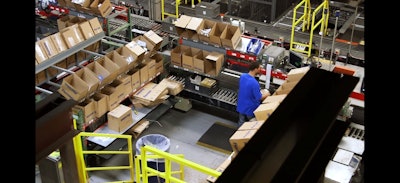
A recent analysis suggests that government jobs data is significantly underestimating the number of jobs created by the e-commerce boom in recent years.
Progressive Policy Institute chief economic strategist Michael Mandel argues that society should also encourage the continued growth of e-commerce — even at the expense of the retail sector.
Although his estimates show that the U.S. lost about 76,000 retails jobs over the past decade, e-commerce, by contrast, created nearly 400,000 new jobs.
"To be honest, this was a surprise to me," Mandel told The New York Times. "I did not expect this."
The Times noted that Mandel's position conflicts with other economists — particularly critics who note that e-retailers are hoping technology and automation will allow them to employ fewer and fewer human workers in their warehouses.
But Mandel told the paper that complete adoption of automation in warehouses will take longer than his skeptics believe.
His position is unconventional, the Times reported, in part because government analyses of e-commerce remain unclear. Mandel said that Amazon claims to employ about 12,000 people in the state of Kentucky, for example, but the federal data shows only 2,640 people working in e-commerce in the state.
The PPI study examined overall warehouse jobs between late 2007 and 2017 and found that, on a county-by-county basis, they tended to mirror construction of "fulfillment centers" for e-commerce.
Although that number could include more traditional warehouses, his estimate for the liberal-leaning think tank also does not take into account many e-commerce workers matched to their positions through temp agencies.
Mandel added that the e-commerce jobs tend to pay better, provide full-time positions and offer benefits.
He said that the transition from brick-and-mortar retail to e-commerce could mirror the economy of the early 20th century, when both manufacturing efficiency and wages increased dramatically.
“This could be the pendulum swinging back,” he told the Times.






















